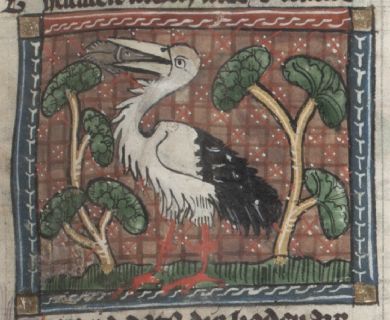Stork
| Latin name: | Ciconia |
| Other names: | Cegogna, Chuigne, Cichogne, Cicogna, Cigogne, Cyconie, Lampo, Odebero, Segonyge, Seingoingne |
| Category: | Bird |
Two crows lead flocks of storks when they cross the sea to Asia
General Attributes
Storks are harbingers of spring. Parents care well for their young, and the young care for their parents when they grow old (an attribute later applied to the hoopoe). They watch their nests so zealously that they lose their feathers from constantly brooding. They are named after the rattling noise they make by striking their beaks. They are companions of society, but enemies of snakes. Two crows lead flocks of storks when they cross the sea to Asia.
Allegory/Moral
As storks make a sound by clashing their bills, so do those who 'with weeping and gnashing of teeth' proclaim their guilt through confession. As the stork is the enemy of the snake, so the righteous should be the enemy of the "snakes" of evil thoughts.
Uses Magical, Medical, Alchemical and Culinary
Hildegard von Bingen says: "...take the stork and its head, throw away the innards, and take off all the feathers. Place the whole cadaver in a new clay pot, perforated with small holes, and heat it, without water, over the fire. Under that pot, place another new clay pot to catch the fat that flows off. Add to this a third as much bear fat and the same amount of butter. Pound the plant called goutweed with an equal weight of herb Robert, and cook this with the fats in a new pot. Strain it through a cloth and make an unguent. If one is insane, or troubled by paralysis, or tormented by gicht [gout] in any of his parts, he should anoint himself with this ointment, and he will be better." (Throop translation)


